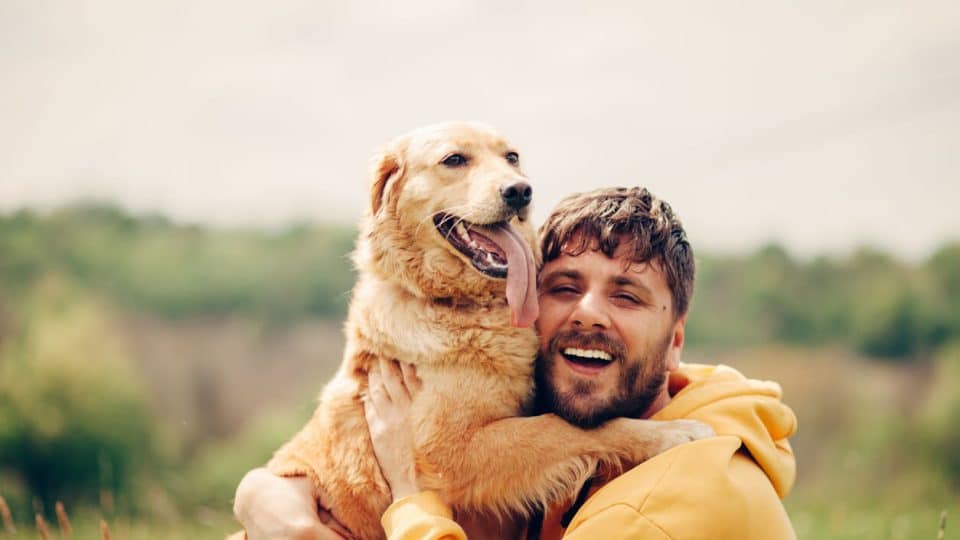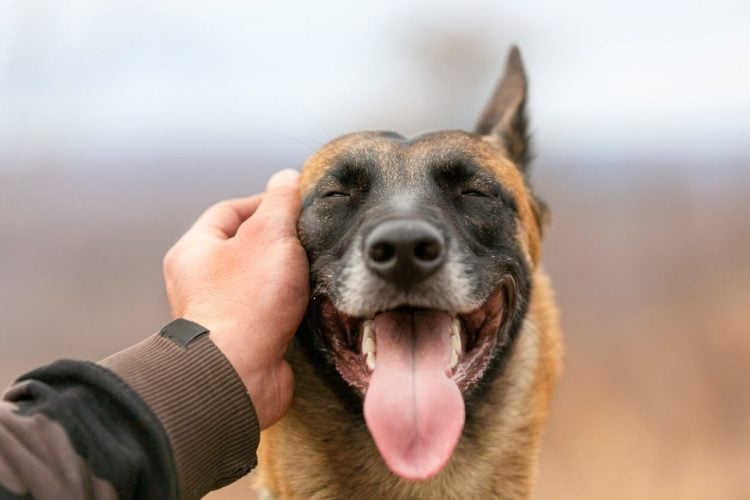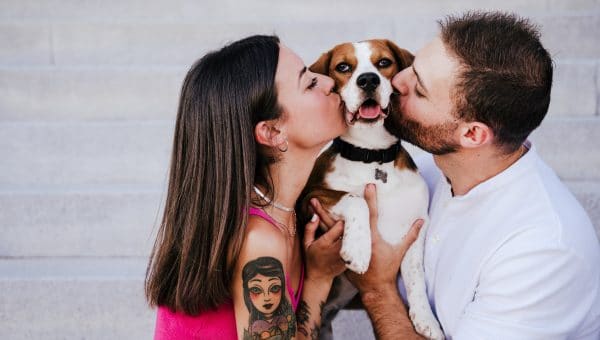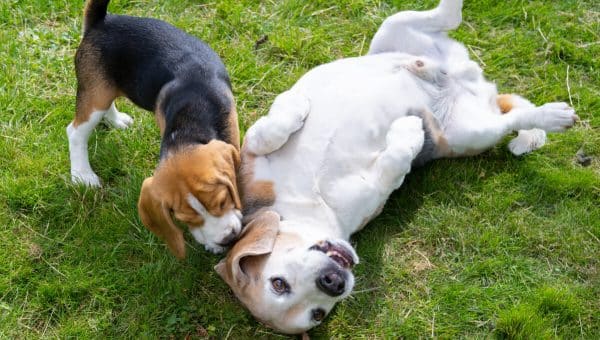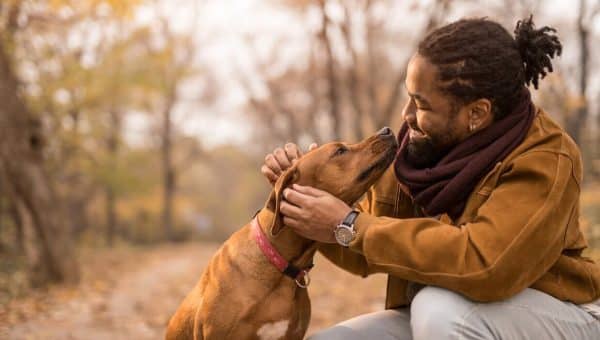- Not a substitute for professional veterinary help.
Looking for signs your dog has imprinted on you? Maybe you’ve heard the term “imprinted” but aren’t sure what it actually means, when it comes to your relationship with your pup.
Imprinting, which happens shortly after birth (or hatching), is usually associated with precocial animals who can see, hear, and move around their environment right away. These animals are born with a drive to attach to someone they can follow and learn from as soon as possible. During this period, they rapidly learn about their identity and the behaviors they should mimic for survival.
In most cases, an animal will imprint on their mother. But some animals will also imprint on humans and even inanimate objects!
Most research on imprinting focuses on birds like ducks and geese who find a human and attach to them immediately after hatching, following them everywhere they go. In this sense, dogs don’t imprint onto their pet parents—but they can develop very strong attachments.
When Is the Imprint Period for Dogs?
Dogs don’t immediately seek someone to attach to from birth. In fact, they only begin to recognize their littermates and mother when they’re about 4 weeks old.
That said, dogs often form very strong attachments to their pet parents.
Between about 7 and 12 weeks of age, dogs go through a critical sensitive period where they can form a strong attachment to a particular person, explains bioethicist and author Dr. Jessica Pierce.
Some people do call this attachment “imprinting,” but this type of bond isn’t quite the same thing. Your dog may feel very attached to you and seek out attention regularly. But unlike actual imprinting, they won’t have a drive to mimic your behavior and learn from it in order to survive.
If you adopted a rescue dog after this key socialization period, you don’t need to worry. Dogs can still form incredibly strong bonds with their human caregivers well into adulthood.
7 Ways to Tell If Your Dog Has Imprinted On You
Of course, you can’t ask your dog who their favorite person is. Even so, there are plenty of ways you can tell they’ve formed a strong attachment.
Here are seven signs your dog imprinted on you—in other words, formed a very strong bond.
1. They give affection
Does your dog give you plenty of wet kisses? You can take that as a strong sign you’re a special person in their world.
Wild dogs and wolves often lick and groom their pack mates. Experts believe this behavior, known as allogrooming, helps build strong bonds within the pack. In short, if your dog licks you, they most likely consider you part of the pack.
2. They hold eye contact
A dog who gazes lovingly into your eyes likely feels very close to you. Research suggests dogs release oxytocin, the love hormone, when gazing into their pet parents’ eyes. This is the same hormone that helps parents and infants bond after birth.
3. They bring you gifts
Does your dog bring you their favorite toy as soon as you walk through the door? This very sweet gesture can mean lots of things, all of them positive! A dog offering you their toy can mean:
- They trust you: Some dogs can be quite possessive of their toys, so a pup who feels willing to share with you trusts you with their most precious belongings.
- They want to play with you: Your dog has picked you as the perfect playmate and is bringing you their toy to spark a good fun time.
- They want your attention: Plenty of pet parents find nothing cuter than their beloved pup bringing them a toy. If you give your dog plenty of attention, they’ll most likely keep on bringing their toys over to get more attention. A dog who wants attention from you likely feels very close to you—and when you give them that attention, you only strengthen your bond.
4. They expose their belly
A dog’s stomach is one of the most vulnerable places on their body, which means they can be pretty selective about who gets to see—and touch!—their bellies.
If your dog rolls onto their back and shows their stomach, especially while sleeping, you can feel pretty confident they trust you and feel safe around you. If they do this while awake, they could be asking for a tummy rub.
5. They sleep near you
Does your dog curl up and go to sleep on your bed? If so, they may see you as a member of their pack and trust you immensely. They may want to help protect you from potential threats, but they also know you’ll keep them safe while they catch up on their rest.
6. They’re happy and excited around you
If your dog can’t contain their excitement when you walk through the door, you can take that as a sure sign they missed your company.
Other signs of happiness include:
- Tail wagging
- Jumping up to meet you
- Licking your face
- Sticking close and following you around
7. They mirror your behavior
Does your dog yawn when you yawn? If so, this could be another sign your dog shares a deep emotional connection with you.
One study found that dogs yawned more when they saw a familiar person yawn than when they saw a non-familiar person yawn. Contagious yawning is a form of empathy that points to a strong emotional connection between pup and pet parent.
Can Imprinting Become Separation Anxiety?
As much as you may want to build a deep connection with your dog, a very strong attachment can have a few potential downsides.
If you become your dog’s secure and only attachment figure, Pierce says, they can become unhappy when you’re not around or don’t have the time to give them as much attention as they want. In some cases, this can lead to separation anxiety or increased stress for your dog.
Many signs your dog has “imprinted” on you, or formed a strong attachment also overlap with signs of canine insecurity and anxiety.
“A dog shadowing your every movement may be quite insecure about their attachment with you—or, they might just really like to be with you,” Pierce explains.
Overlapping signals of a strong attachment and anxiety include:
- Becoming your “shadow” by following your every move
- Cuddling your belongings
- Constantly seeking your attention and company
If your dog seems anxious or distressed and their attention-seeking behavior becomes disruptive, it’s always a good idea to talk to your vet. They can offer more guidance on how to handle the behavior.
Of course, your dog may simply love you and want to spend a lot of time with you—and you can grant their wish with plenty of affection, walks, and playtime.
